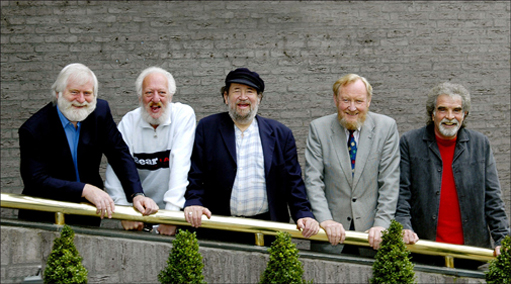
“It was 1964 and I’d just given up my good, pensionable ESB job to join this new group, The Dubliners. We were in Doheny & Nesbitts and Ronnie (Drew) and Barney (McKenna) had a huge row and the band broke up. I was devastated. Next day Ronnie rings me up about a concert. “I thought the group broke up last night” says I. “Ah don’t take any notice, that happens every week” replies Ronnie.
Four decades later and the Dubliners longevity and enduring contribution to the revival of Irish folk and traditional music is unparalleled. “When I first joined people were saying we might last about three years, they thought we were a bit of a new fad singing the old songs and treating them in a new way.” History relates that The Dubliners were the group who put Irish ballads at the heart of the Sixties Folk revival. “We’ve probably lasted so long because of our attitude; we just work from one year to the next”.
Through the years The Dubliners have evolved constantly, undergoing many changes of personnel including the tragic untimely deaths of Luke Kelly (1984) and Ciarán Bourke (1988). “The group’s chemistry is amazing really. New blood brings a fresh lease of life, and each new member has brought their own style. In 1974 Jim McCann joined when Ronnie left and each singer that came brought their own personality and repertoire. Paddy Reilly joining in 1995 brought The Fields of Athenry and his own personal songs”.
In 1967 the group had a major breakthrough when they performed ‘Seven Drunken Nights’ on Top Of The Pops; the song, which was banned by RTE, was typical of their gritty, bawdy, extremely popular balladry . “When we were told we were on TOTP, I remember asking ‘how much are we getting’ and our manager replied ‘Are you joking, you’re talking about money, you’re on TOTP, people would give their left arm for this’. After that we moved from playing small folk clubs to selling out the Royal Albert Hall in London”.
In 1987 the Dubliners were back on TOTP with the Pogues performing ‘The Irish Rover’. “We were making a joke that every twenty years we get invited back. I remember arriving back in Dublin airport and there was press and cameras everywhere – the real red carpet treatment. One reporter asked Barney, what it felt like to be a star, to which he replied “I’m over the moon”.
Legend has it the band was formed in the back room of O'Donoghues bar in Dublin in 1962 and was initially called ‘The Ronnie Drew Group’. Ronnie left the group twice, first in 1974, returning in 1979 and again in 1995. His instantly recognisable gravelly voice has been described as ‘the sound of coal being crushed under a door’. Earlier this year, a plethora of Irish music stars recorded ‘The Ballad of Ronnie Drew’ in tribute to his and The Dubliners immense influence on Irish music. “I got a call from one of Bono's pals telling me Bono had written a song for Ronnie who’s recovering from throat cancer. So we spent the day in the studio with U2, Kila, Sinéad O’Connor, Andrea Corr, and Moya Brennan. And Shane McGowan and Christy Moore sang a verse. After the recording there was a mutual feeling that we should get together and do something again”.
A mark of the groups lasting impact has been their successful collaborations with groups spanning the musical spectrum; from punk legends The Pogues to rock guitar luminary Rory Gallagher. “We did some work with Rory in 1994, the year before he died, and recorded ’The Barley and Grape Rag”; Rory and Ronnie swapping lead vocals. Beforehand we’d been nervous about playing with one of the Worlds greatest rock guitarists. When the session ended Rory says ‘Jesus John you’ve no idea how nervous I was about playing with the Dubliners’.
The Dubliners have been described as the Fathers of the Irish folk revival. “I suppose the term Irish folk band does do us justice. We’ve also branched out both individually and as a band. I played on Kate Bush’s ‘Hounds of Love’ and in 2003 one of my tunes ‘The Marino Waltz’ was recorded by André Rieu – ‘The King of Waltz’ - it’s also used on RTE on a Bord Na Mona advert.”
While playing frequently in Germany, Holland, the UK and Scandinavia – “we have about 80 concerts already planned this year” - the Dubliners are infrequent visitors to France. On March 2008 , 17th, they play Le Grand Rex, Paris supported by the exceptionally talented Irish Trad outfit Teada and a host of Irish dancers. Thereafter they continue on a short French tour to Bordeaux (18th), Nantes (19th) and they’ll be in Joue-les-Tours (15th).
With 46 years on the road behind them, the pioneering Dubliners are truly the Spiritual Godfathers of today’s Irish music groups. In these times of short-lived popular music fads, their longevity is a tribute to pure talent and the sheer joy of playing music; but most of all a celebration of the musical heritage of their Liffeyside home
© Copyright Irish Eyes
TOP
|